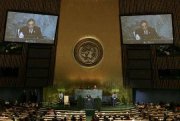
International (MNN/ODM) — The United Nation's Human Rights
Council has passed the Religion Defamation Resolution, much to the dismay of
Christians.
Muslim countries urged passage of non-binding resolution to
protect religion from criticism, specifically Islam. The resolution urges countries to provide
"protection against acts of hatred, discrimination, intimidation and coercion
resulting from defamation of religions and incitement to religious hatred in
general."
Paul Estabrooks, minister-at-large with Open Doors, says, "This resolution sounds really good on paper,
and we agree with the tolerance and harmony issues. But the very crux of the
issue is our concern for the Christians who are a minority in dominant Muslim
lands."
He added that Muslim nations argued that Islam should be
shielded from criticism in the media and other areas of public life. According to the Associated Press, Muslim
countries cited Western criticism of Sharia Law (strict Islamic law) and
cartoons depicting Muhammad, founder of Islam, as examples of unacceptable free
speech.
Open Doors joins a coalition of more than 180 other
non-governmental agencies from more than 50 countries which signed a statement last
week protesting passing of the resolution. All voiced similar concern that the
resolution could be used to justify anti-blasphemy, anti-conversion, or apostasy
laws.
Keep praying for believers under fire. "They've already been limited in how they can
live out their faith and defend charges–unjust charges–against them," Estabrooks says. "We feel
that this really does limit and marginalize Christians even more to where they are
not even able to deal with the injustices that they confront."
Open Doors USA
President/CEO Dr. Carl Moeller urges, "Please
join me in prayer that this resolution will not be put into practice by U.N.
member states. Christianity is under attack around the world, and we as
believers must speak out when confronted by injustice."
The U.N. Human Rights Council is dominated by Muslim and
African countries. Its resolutions are not binding but are meant to act as
recommendations for U.N. member countries on issues of human rights, according
to Associated Press.